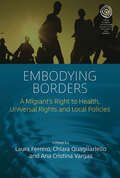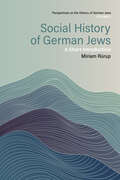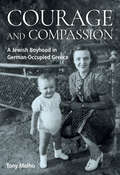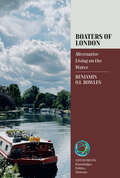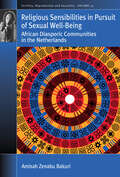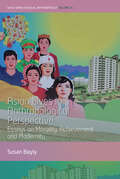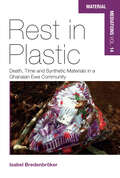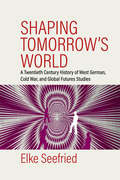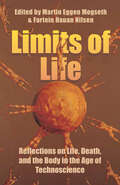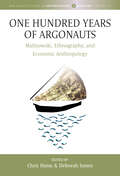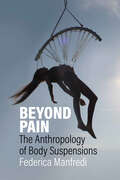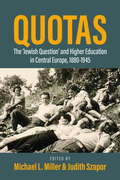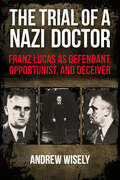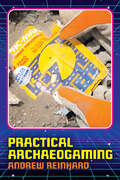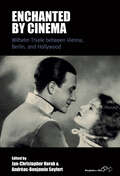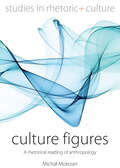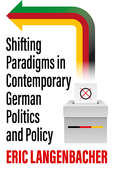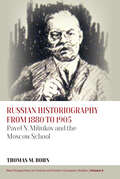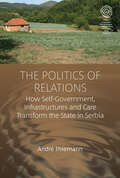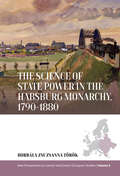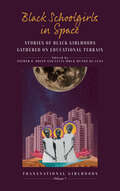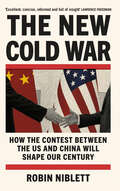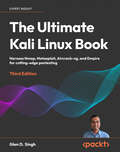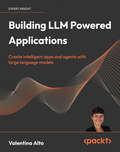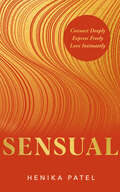- Table View
- List View
Embodying Borders: A Migrant’s Right to Health, Universal Rights and Local Policies (EASA Series #41)
by Laura Ferrero, Chiara Quagliariello Ana Cristina VargasBased on extensive field research, the essays in this volume illuminate the experiences of migrants from their own point of view, providing a critical understanding of the complex social reality in which each experience is grounded. Access to medical care for migrants is a fundamental right which is often ignored. The book provides a critical understanding of the social reality in which social inequalities are grounded and offers the opportunity to show that right to health does not correspond uniquely with access to healthcare.
Social History of German Jews: A Short Introduction (Perspectives on the History of German Jews #2)
by Miriam RürupTracing the social history of modern German Jews from the end of the 18th century up to the aftermath of World War II, Miriam Rürup follows their ascent into the middle and upper middle classes through repeated experiences of setbacks but also of self-assertion. In doing so it is explained how Jewish life changed under the auspices of emancipation and what impact these changes had on the demographic and social profile of the Jewish minority. With a focus on the daily interactions between Jews and other Germans when choosing a home, profession, or school, for example, Social History of German Jews shows the contrasting processes of integration and exclusion in a new light.
Courage and Compassion: A Jewish Boyhood in German-Occupied Greece
by Tony MolhoFirst published in Greek in 2023. The Greek edition was awarded the OURANIS PRIZE of the Academy of Athens In this extraordinary personal account of childhood and survival during the Holocaust, Professor Tony (Antony) Molho recounts his adventures in 1940s Greece from ages four to six, as his parents risked everything to hide him from the German occupiers. In doing so he pays homage to the many ordinary people who selflessly protected his family, demonstrating that even in the darkest times the self-sacrifice and kindness of modest people can still prevail. Delving into the power of memory, and exploring questions of personal identity, and the weight of the Shoah, Courage and Compassion goes beyond the bounds of conventional memoir, as Tony Molho also reflects on the nature of Jewish identity in the aftermath of the Holocaust and on how his personal awareness of this trauma has helped him to understand the course of his own life.
Boaters of London: Alternative Living on the Water (Lifeworlds: Knowledges, Politics, Histories #5)
by Ben BowlesLondon and the Southeast of England is home to an alternative community of people called 'boaters': individuals and families who live on narrowboats, cruisers and barges, along a network of canals and rivers. Many of these people move from place to place every two weeks due to mooring rules and form itinerant communities in the heart of some of the UK’s most built-up and expensive urban spaces. Boaters of London is an ethnography that delves into the process of becoming a boater, adopting an alternative lifestyle on the water and the political impact that this travelling population has on the state.
Religious Sensibilities in Pursuit of Sexual Well-Being: African Diasporic Communities in the Netherlands (Fertility, Reproduction and Sexuality: Social and Cultural Perspectives #55)
by Amisah Zenabu BakuriThe self-identifying Ghanaian-Dutch and Somali-Dutch communities residing in the Randstad area of the Netherlands are deeply impacted by religious beliefs and cultural factors in their approach towards sexual health practices, well-being and pleasure. This book shows how religious sensibilities shape the physical activities, beauty practices, and gendered roles that are adopted into the daily lives of these communities in pursuit of their sexual and general well-being. Through an ethnographic account, it explores and challenges the assumptions held around the complex relationship between religion and sexuality.
Asian Lives in Anthropological Perspective: Essays on Morality, Achievement and Modernity (WYSE Series in Social Anthropology #16)
by Susan BaylyContemporary Asian societies bear the imprint of the experience and afterlives of colonialism, revolutionary socialism and religious and secular nationalism in dramatically contrasting ways. Asian Lives in Anthropological Perspective draws together essays that demonstrate the role of these far-reaching transformations in the shaping of two Asian settings in particular – India and Vietnam. It traces historical and contemporary realities through a variety of compelling topics including the lived experience of India’s caste system and the ethical challenges faced by Vietnamese working women.
Rest in Plastic: Death, Time and Synthetic Materials in a Ghanaian Ewe Community (Material Mediations: People and Things in a World of Movement #14)
by Isabel BredenbrökerIn Peki, an Ewe town in the Ghanaian Volta Region, death is a matter of public concern. By means of funeral banners printed with synthetic ink on PVC, public lyings in state, cemented graves and wreaths made from plastic, death occupies a prominent place in the world of the living. Rest in Plastic gives an insight into local entanglements of death, synthetic materials and power in Ewe community. It shows how different materials and things that come to shape power relations, exist in a delicate balance between state and local governance, kin and outsiders, death and life, the invisible and the visible, movement and containment.
Shaping Tomorrow's World: A Twentieth-Century History of West German, Cold War, and Global Futures Studies
by Elke SeefriedShaping Tomorrow’s World tells the crucial story of how futures studies developed in West Germany, Europe, the US and within global futures networks from the 1940s to the 1980s. It charts the emergence of different approaches and thought styles within the field ranging from Cold War defense intellectuals such as Herman Kahn to critical peace activists like Robert Jungk. Engaging with the challenges of the looming nuclear war, the changing phases of the Cold War, ‘1968’, and the growing importance of both the Global South and environmentalism, this book argues that futures scholars actively contributed to these processes of change. This multiple award-winning study combines national and transnational perspectives to present a unique history of envisioning, forecasting, and shaping the future.
Limits of Life: Reflections on Life, Death, and the Body in the Age of Technoscience
by Martin Eggen Mogseth & Fartein Hauan NilsenNew technologies and scientific imagination rearrange the boundary that we identify as the beginning and end of life. New techno-social constellations, such as the ever-increasing presence of digital avatars and genetic screenings, implore us to reconsider and transcend the existing definitions of life and death. Through a multidisciplinary approach, this volume explores how the limitations and perceived finality of life and death are reconstituted through engagements with modern technology.
One Hundred Years of Argonauts: Malinowski, Ethnography and Economic Anthropology (Max Planck Studies in Anthropology and Economy #13)
by Chris Hann and Deborah JamesMalinowski’s Argonauts of the Western Pacific was a major contribution to anthropological theory and method, while simultaneously establishing the sub-field of economic anthropology. Even a century after its publication, Malinowski’s pioneering work remains critical for anthropology in a postcolonial age. This volume uses ethnographic studies from around the world to contextualize the work politically and intellectually, examining its gestation and influence from multiple perspectives. It critically explores the meaning of “economy” for Malinowski from his formation in the Austro-Hungarian Empire to his path-breaking fieldwork in Melanesia and ensuing career in London.
Beyond Pain: The Anthropology of Body Suspensions
by Federica ManfrediThe practice of body suspension — piercing one’s own flesh with metal hooks and hanging from them — and its uniquely sprawling community challenge our cultural understanding of pain. The suspendees experience physical suffering to trigger altered states of consciousness that help them define and create an enhanced version of the self. Through experimental and practice-based methodology, Beyond Pain combines thirteen years of intermittent ethnographical fieldwork during suspension festivals and private events in Italy, Portugal, and Norway, along with online sites such as Facebook groups, to uncover the often silenced and misunderstood voices of the people who undertake this practice.
Quotas: The “Jewish Question” and Higher Education in Central Europe, 1880-1945
by Michael L. Miller and Judith SzaporIn 1920, the Hungarian parliament introduced a Jewish quota for university admissions, making Hungary the first country in Europe to pass antisemitic legislation following World War I. Quotas explores the ideologies and practices of quota regimes and the ways quotas have been justified, implemented, challenged, and remembered from the late nineteenth century until the middle of the twentieth century. In particular, the volume focuses on Central and Eastern Europe, with chapters covering the origins of quotas, the moral, legal, and political arguments developed by their supporters and opponents, and the social and personal impact of these attempts to limit access to higher education.
The Trial of a Nazi Doctor: Franz Lucas as Defendant, Opportunist, and Deceiver
by Andrew WiselyThe Trial of a Nazi Doctor examines the life of Franz Bernhard Lucas (1911-1994), an SS camp doctor with assignments in Auschwitz, Mauthausen, Stutthof, Ravensbrück, and Sachsenhausen. Covering his career during the Third Reich and then his prosecution after 1945, especially in the Frankfurt Auschwitz trial, Andrew Wisely explores the lies, obfuscations, misrepresentation, and confusions that Lucas himself created to deny, distract from or excuse his participation in the Nazi’s genocidal projects. By juxtaposing Lucas’s own testimonies and those of a wide range of witnesses: former camp inmates and Holocaust survivors; friends, colleagues, and relatives; and media observers, Wisely provides a nuanced study of witness testimonies and the moral identity of Holocaust perpetrators.
Practical Archaeogaming
by Andrew ReinhardAs a sequel to Archaeogaming: an Introduction to Archaeology in and of Video Games, the author focuses on the practical and applied side of the discipline, collecting recent digital fieldwork together in one place for the first time to share new methods in treating interactive digital built environments as sites for archaeological investigation. Fully executed examples of practical and applied archaeogaming include the necessity of a rapid archaeology of digital built environments, the creation of a Harris matrix for software stratigraphy, the ethnographic work behind a human civilization trapped in an unstable digital landscape, how to conduct photogrammetry and GIS mapping in procedurally generated space, and how to transform digital artifacts into printed three-dimensional objects. Additionally, the results of the 2014 Atari excavation in Alamogordo, New Mexico are summarized for the first time.
Enchanted by Cinema: Wilhelm Thiele between Vienna, Berlin, and Hollywood (Film Europa #29)
by Jan-Christopher Horak and Andréas-Benjamin SeyfertWilliam Thiele is remembered today as the father of the sound film operetta with seminal classics such as Drei von der Tankstelle (1930). While often considered among the most accomplished directors of Late Weimar cinema, as an Austrian Jew he was vilified during the onset of the Nazi regime in 1933 and fled to the United States where he continued making films until the end of his career in 1960. Enchanted by Cinema closely examines the European musical film pioneer’s work and his cross-cultural perspective across forty years of filmography in Berlin and Hollywood to account for his popularity while discussing issues of ethnicity, exile, comedy, music, gender, and race.
Culture Figures: A Rhetorical Reading of Anthropology (Studies in Rhetoric and Culture #10)
by Michał MokrzanEthnographic research, anthropological theory, and the understanding of the objects of inquiry, are co-created through figuration (using tropes and rhetorical figures) and techniques of persuasion. Delving into descriptive ethnography and theoretical texts spanning across classical monographs and recent texts in cultural anthropology, Culture Figures places rhetoric and rhetoricity as central to the discipline’s self-understanding. It focuses on how understandings of ‘culture’ and social life are shaped and conveyed in cultural anthropology through textual rhetoric. The book demonstrates how processes of using tropes and modes of persuasion underlie the creation of meanings or misunderstandings in society.
Shifting Paradigms in Contemporary German Politics and Policy
by Eric LangenbacherGermany has undergone more change in the past two years than it has experienced in decades. In the fall of 2021, the Social Democratic Party unexpectedly surged to first place in the Bundestag elections, going on to lead a coalition of SPD, Greens, and Free Democrats that promised to “dare more progress” domestically. Then just two months after the new government was installed, Russia invaded Ukraine. The contributions in this volume investigate the altered state of German politics and predict the trajectory of Europe’s leading power in the transformed geopolitical environment.
Russian Historiography from 1880 to 1905: Pavel N. Miliukov and the Moscow School (New Perspectives on Central and Eastern European Studies #6)
by Thomas M. BohnIn Russian historiography, the Moscow School’s paradigm shift from political and legal history to social and economic history was markedly driven by Pavel Miliukov (1859-1943), the late leader of the Constitutional Democrats and foreign minister of the Provisional Government. Russian Historiography from 1880 to 1905 develops a narrative of historical sociology’s advancement through the Moscow School under Miliukov’s influence and provides a window into his decision making as a political figure who based his leadership not on public opinion but on the effectiveness of historical processes.
The Politics of Relations: How Self-Government, Infrastructures, and Care Transform the State in Serbia (EASA Series #49)
by André ThiemannRethinking the contributions of the Manchester School of Social Anthropology for political ethnography, the Politics of Relations elaborates its relational approach to the state along four interlaced axes of research – embeddedness, boundary work, modalities and strategic selectivity – that enable thick comparisons across spatio-temporal scales of power. In Serbia local experiences of self-government, infrastructure and care motivate its citizens to “become the state” while cursing it heartily. While both officials and citizens strive for a state that enables a “normal life,” they navigate the increasingly illiberal politics enacted by national parties and which are tolerated by trans-national donors.
The Science of State Power in the Habsburg Monarchy, 1790-1880 (New Perspectives on Central and Eastern European Studies #5)
by Borbala Zsuzsanna TörökThe formation of modern European states during the long 19th century was a complicated process, challenged by the integration of widely different territories and populations. The Science of State Power in the Habsburg Monarchy, 1790-1880 builds on recent research to investigate the history of statistics as an overlooked part of the sciences of the state in Habsburg legal education as well as within the broader public sphere. By exploring the practices and social spaces of statistics, author Borbála Zsuzsanna Török uncovers its central role in imagining the composite Habsburg Monarchy as a modern and unified administrative space.
Black Schoolgirls in Space: Stories of Black Girlhoods Gathered on Educational Terrain (Transnational Girlhoods #7)
by Esther O. Ohito and Lucía Mock Muñoz de LunaLocating Black girls’ desires, needs, knowledge bases, and lived experiences in relation to their social identities has become increasingly important in the study of transnational girlhoods. Black Schoolgirls in Space pushes this discourse even further by exploring how Black girls negotiate and navigate borders of blackness, gender, and girlhood in educational spaces. The contributors of this collected volume highlight Black girls as actors and agents of not only girlhood but also the larger, transnational educational worlds in which their girlhoods are contained.
The New Cold War: How the Contest Between the US and China Will Shape Our Century
by Robin NiblettAn urgent and essential assessment of the global contest between the US and China, and how looking to history will help us to navigate it, from former Director of Chatham House"An illuminating book for the interested citizen as well as for those making policy" - Hillary Rodham Clinton We have entered a new Cold War. The contest between America and China is global and unbridgeable, and it encompasses all major instruments of statecraft - economic, political and military. It has its tinder box: Taiwan. And both protagonists are working hard to draw allies to their side from across the world. We stand at its beginning. But this Cold War is nothing like the conflict between the Soviet Union and the West which defined the second half of the twentieth century. We need new ideas to navigate its risks and avoid a globally devastating hot war. In this urgent and necessary book, Robin Niblett argues that only by looking back can we learn the lessons to guide us through this new reality: he goes through the ten ways in which the New Cold War is different and offers five rules for navigating its onset. How we manage this contest will determine not only whether there is still space for international cooperation to deal with our many global challenges, from the climate emergency to the technological revolution, but also who will lead the twenty-first century and, quite simply, the course of all our futures.
The Ultimate Kali Linux Book: Harness Nmap, Metasploit, Aircrack-ng, and Empire for cutting-edge pentesting
by Glen D. SinghExcel in penetration testing by delving into the latest ethical hacking tools and techniques from scratch Purchase of the print or Kindle book includes a free eBook in PDF format.Key FeaturesLearn to think like an adversary to strengthen your cyber defencesExecute sophisticated real-life penetration tests, uncovering vulnerabilities in enterprise networks that go beyond the surface levelSecurely manipulate environments using Kali Linux, ensuring you're fully equipped to safeguard your systems against real-world threatsBook DescriptionEmbark on an exciting journey into the world of Kali Linux – the central hub for advanced penetration testing. Honing your pentesting skills and exploiting vulnerabilities or conducting advanced penetration tests on wired and wireless enterprise networks, Kali Linux empowers cybersecurity professionals. In its latest third edition, this book goes further to guide you on how to setup your labs and explains breaches using enterprise networks. This book is designed for newcomers and those curious about penetration testing, this guide is your fast track to learning pentesting with Kali Linux 2024.x. Think of this book as your stepping stone into real-world situations that guides you through lab setups and core penetration testing concepts. As you progress in the book you’ll explore the toolkit of vulnerability assessment tools in Kali Linux, where gathering information takes the spotlight. You'll learn how to find target systems, uncover device security issues, exploit network weaknesses, control operations, and even test web applications. The journey ends with understanding complex web application testing techniques, along with industry best practices. As you finish this captivating exploration of the Kali Linux book, you'll be ready to tackle advanced enterprise network testing – with newfound skills and confidence.What you will learnEstablish a firm foundation in ethical hackingInstall and configure Kali Linux 2024.1Build a penetration testing lab environment and perform vulnerability assessmentsUnderstand the various approaches a penetration tester can undertake for an assessmentGathering information from Open Source Intelligence (OSINT) data sourcesUse Nmap to discover security weakness on a target system on a networkImplement advanced wireless pentesting techniquesBecome well-versed with exploiting vulnerable web applicationsWho this book is forThis pentesting book is for students, trainers, cybersecurity professionals, cyber enthusiasts, network security professionals, ethical hackers, penetration testers, and security engineers. If you do not have any prior knowledge and are looking to become an expert in penetration testing using the Kali Linux, then this book is for you.
Building LLM Powered Applications: Create intelligent apps and agents with large language models
by Valentina AltoGet hands-on with GPT 3.5, GPT 4, LangChain, Llama 2, Falcon LLM and more, to build LLM-powered sophisticated AI applicationsKey FeaturesEmbed LLMs into real-world applicationsUse LangChain to orchestrate LLMs and their components within applicationsGrasp basic and advanced techniques of prompt engineeringBook DescriptionBuilding LLM Powered Applications delves into the fundamental concepts, cutting-edge technologies, and practical applications that LLMs offer, ultimately paving the way for the emergence of large foundation models (LFMs) that extend the boundaries of AI capabilities. The book begins with an in-depth introduction to LLMs. We then explore various mainstream architectural frameworks, including both proprietary models (GPT 3.5/4) and open-source models (Falcon LLM), and analyze their unique strengths and differences. Moving ahead, with a focus on the Python-based, lightweight framework called LangChain, we guide you through the process of creating intelligent agents capable of retrieving information from unstructured data and engaging with structured data using LLMs and powerful toolkits. Furthermore, the book ventures into the realm of LFMs, which transcend language modeling to encompass various AI tasks and modalities, such as vision and audio. Whether you are a seasoned AI expert or a newcomer to the field, this book is your roadmap to unlock the full potential of LLMs and forge a new era of intelligent machines.What you will learnExplore the core components of LLM architecture, including encoder-decoder blocks and embeddingsUnderstand the unique features of LLMs like GPT-3.5/4, Llama 2, and Falcon LLMUse AI orchestrators like LangChain, with Streamlit for the frontendGet familiar with LLM components such as memory, prompts, and toolsLearn how to use non-parametric knowledge and vector databasesUnderstand the implications of LFMs for AI research and industry applicationsCustomize your LLMs with fine tuningLearn about the ethical implications of LLM-powered applicationsWho this book is for Software engineers and data scientists who want hands-on guidance for applying LLMs to build applications. The book will also appeal to technical leaders, students, and researchers interested in applied LLM topics. We don’t assume previous experience with LLM specifically. But readers should have core ML/software engineering fundamentals to understand and apply the content.
Sensual: Connect Deeply, Express Freely, Love Intimately
by Henika PatelSensual is a guide to understanding the inner spark we are all born with, why and how we lose it, and how to reclaim our power to live the life we truly want. Sensuality is about more than just pleasure. Sensuality is an innate power that can help you to tune in to your body, mind, and spirit. To be sensual is to know yourself so intimately that you can move through life with confidence and clarity, deeply connected to the fire within. In this book, Henika Patel invites you on a journey of expansion to find your unapologetic, unashamed, fully expressed sensual spirit. Blending Eastern philosophy and Western psychology with practices, rituals, and stories from her own life, Henika will empower you to: – Overcome blocks, shame, and numbness – Unleash and express your authentic desires – Discover your inner spark and confidence – Find sensuality, connection, and freedom in all areas of your life, from love and creativity to work and relationships Are you ready to connect with your sensual power?
